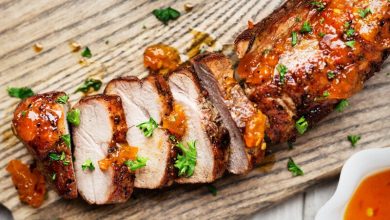African hot sauce, often referred to as “peri-peri sauce” or “piri-piri sauce,” is a spicy chili sauce that originates from various African countries, with its roots traced back to the Portuguese colonization of the African continent. Here’s a detailed breakdown of what it is, its history, components, preparation steps, and the time needed to prepare it:
What is African Hot Sauce (Peri-Peri Sauce)?
- African hot sauce is a fiery and flavorful chili sauce made from a base of red chili peppers, garlic, vinegar, and various spices. It is known for its intense heat and rich flavor profile.
History of African Hot Sauce:
- The history of African hot sauce is intertwined with Portuguese exploration and colonization in Africa during the 15th century. Portuguese explorers encountered the African Bird’s Eye chili pepper, also known as piri-piri or peri-peri, in regions like Mozambique and Angola.
- The Portuguese adapted the indigenous use of these chilies into a spicy sauce, and the sauce spread through their trade routes. Over time, it became popular in various African countries, particularly in regions influenced by Portuguese culture.
Components of African Hot Sauce:
- African hot sauce typically includes the following components:
- Red Bird’s Eye Chili Peppers: These are the primary source of heat and flavor.
- Garlic: Adds depth and aroma to the sauce.
- Vinegar: Provides acidity and helps preserve the sauce.
- Spices: Common spices may include paprika, salt, and sometimes herbs like oregano or basil.
- Oil: Often olive oil or vegetable oil is used to create a smoother texture.
Steps to Prepare African Hot Sauce (Peri-Peri Sauce):
- Gather Ingredients: You’ll need red Bird’s Eye chili peppers, garlic cloves, vinegar, spices, and oil.
- Roast Chilies and Garlic: Roast the chili peppers and garlic cloves in a hot, dry pan until they begin to char slightly. This enhances their flavor.
- Blend: Transfer the roasted chilies and garlic to a blender or food processor. Add vinegar, spices, and a bit of oil.
- Blend Until Smooth: Blend until you achieve a smooth and uniform consistency. Adjust the spiciness and flavor by adding more chili peppers, spices, or vinegar if needed.
- Strain (Optional): If you prefer a smoother sauce, strain the mixture through a fine mesh sieve to remove any remaining solids.
- Bottle and Store: Transfer the sauce to a sterilized glass bottle or jar. Seal it tightly and store it in the refrigerator. The flavors will meld and intensify over time.
Time Needed to Prepare African Hot Sauce:
- The time needed to prepare African hot sauce can vary, but on average, it takes about 20-30 minutes to roast, blend, and bottle the sauce. However, allowing it to mature in the refrigerator for a few days to a week can enhance its flavors.
Remember that the spiciness level of the sauce depends on the number of chili peppers used, so adjust it to your preference. Enjoy your homemade African hot sauce!
Certainly, here are the nutrition facts and health information for African Hot Sauce (Peri-Peri Sauce):
Nutrition Facts (Per Serving – 1 tablespoon, approximately):
- Calories: 10-15 kcal
- Total Fat: 1 gram
- Sodium: 0-50 mg (varies depending on added salt)
- Total Carbohydrates: 1-2 grams
- Dietary Fiber: 0-1 gram
- Sugars: 0-1 gram
- Protein: 0 grams
- Vitamin C: Varies but can be high due to chili peppers
- Capsaicin: The compound responsible for the spicy heat, which can vary widely depending on the number of chili peppers used.
Health Information:
-
Spicy Flavor and Metabolism: The capsaicin in chili peppers, a key ingredient in African Hot Sauce, may slightly increase metabolism and help with weight management when consumed regularly in moderate amounts.
-
Vitamin C: African Hot Sauce can be a good source of vitamin C due to the presence of chili peppers. Vitamin C is essential for immune function, skin health, and overall well-being.
-
Antioxidant Properties: Some ingredients in African Hot Sauce, like garlic and chili peppers, contain antioxidants that can help combat free radicals and reduce oxidative stress in the body.
-
Anti-Inflammatory: Garlic, one of the primary components, is known for its potential anti-inflammatory properties, which may contribute to overall health.
-
Heart Health: While the sauce is generally low in fat and calories, the capsaicin in chili peppers may have a positive impact on heart health by promoting good circulation and reducing blood pressure.
-
Digestive Benefits: Spicy foods like African Hot Sauce may aid digestion by increasing saliva production and promoting the release of digestive enzymes.
-
Individual Tolerance: It’s important to note that the spiciness of the sauce can vary widely, and individual tolerance to spicy foods differs. If you have a low tolerance for spicy foods, use the sauce in moderation.
-
Sodium Content: Be mindful of the sodium content, as it can vary depending on the brand or recipe. Too much sodium can be detrimental to heart health and should be consumed in moderation.
-
Homemade vs. Store-Bought: Preparing homemade African Hot Sauce allows you to control the ingredients and adjust the nutrition to your preferences, such as reducing salt or using healthier oils.
Remember that the nutritional content of homemade sauces can vary based on the specific ingredients and their quantities. It’s a flavorful addition to your meals, but moderation is key for those with sensitivity to spice or sodium.



